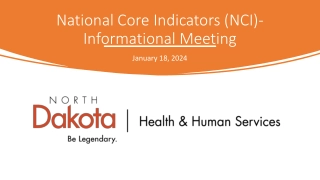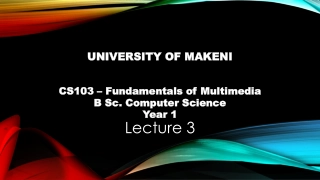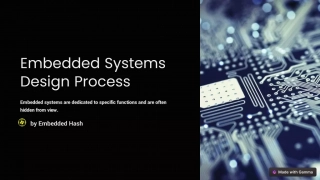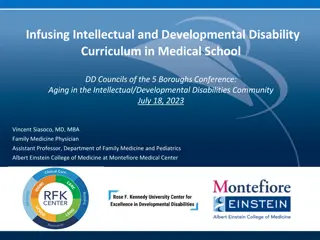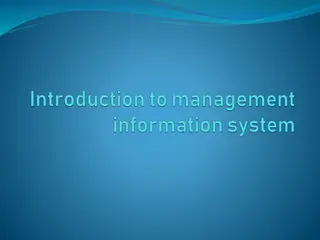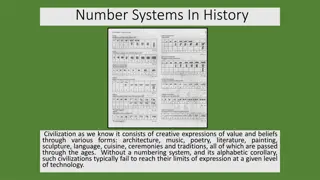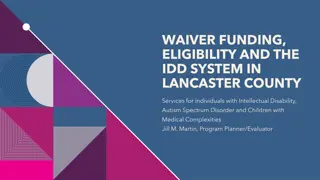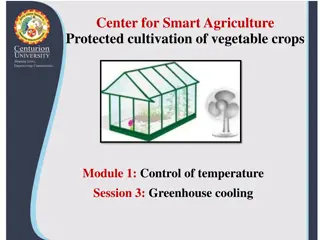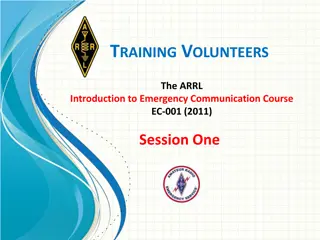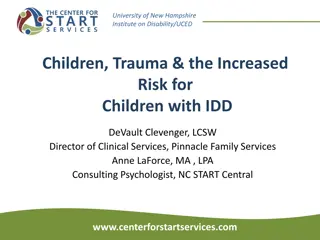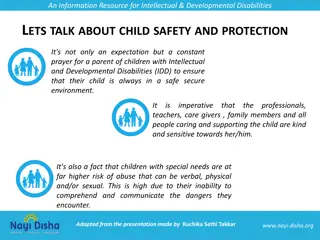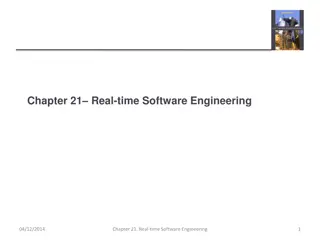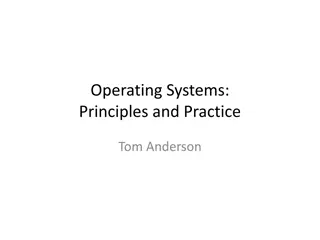Enhancing Food Systems for Improved Food Security and Job Creation
The importance of improving food systems to achieve sustainable development goals and enhance food security and job creation. It covers topics such as the current food systems, the impact of these systems, jobs in the food systems value chain, and key recommendations.
8 views • 24 slides
National Core Indicators (NCI) Informational Meeting
Learn about the NCI-IDD project, survey scheduling, consent process, and implementation timelines. Discover how NCI assesses quality of life, services, and outcomes to improve support systems.
0 views • 25 slides
Understanding Multimedia Systems: Hardware and Software Components
Multimedia systems require specific hardware and software components to meet the demands of producing and playing multimedia content. Development systems are used for creating content with higher specifications, while playback systems are used for playing multimedia files with lower specifications.
8 views • 46 slides
Practical Approaches for Supporting Students with Exceptionalities
Explore evidence-based strategies for promoting appropriate classroom behavior in students with exceptionalities, including considerations for word choice, behavior management, and understanding intellectual and developmental differences. Gain insights into the unique support needs of individuals wi
0 views • 35 slides
Embedded Systems Design Process in the Embedded systems
Embedded systems are all around us, from the tiny microcontrollers in our household appliances to the sophisticated control systems in cars and aeroplanes. But how are these systems designed? Let's delve into the basics of the embedded systems design process in simple terms that anyone can understan
2 views • 9 slides
Overview of Distributed Systems: Characteristics, Classification, Computation, Communication, and Fault Models
Characterizing Distributed Systems: Multiple autonomous computers with CPUs, memory, storage, and I/O paths, interconnected geographically, shared state, global invariants. Classifying Distributed Systems: Based on synchrony, communication medium, fault models like crash and Byzantine failures. Comp
9 views • 126 slides
Infusing Intellectual and Developmental Disability Curriculum in Medical School
This presentation highlights the integration of an Intellectual and Developmental Disability (IDD) curriculum in medical schools, emphasizing the importance of addressing healthcare disparities. The curriculum evolution, including grants and remote implementations due to the COVID-19 pandemic, is di
6 views • 6 slides
Operating Systems
An operating system is a crucial program that manages all other programs on a computer. It handles tasks like input recognition, file management, and device control. There are different types of operating systems such as single-user, single-task systems, multi-user, multi-task systems, real-time ope
6 views • 11 slides
Understanding Information Systems in Organizational Management
Management in organizations is divided into three levels: operational, tactical, and strategic. Each level requires different information systems to support various activities. Operational systems focus on routine transactions and control processes, while middle-level systems aid in semi-structured
8 views • 39 slides
Understanding Negative Results in Systems Research
Systems research encompasses various areas such as operating systems, networking, and distributed systems. Negative results in systems research often go unpublished, leading researchers to focus on curating positive outcomes. This practice can hinder the credibility of scientific findings and impede
5 views • 23 slides
Explore the Top 5 Trends in Alarm Systems with Shellharbour Security Systems
Explore the latest trends in alarm systems with Shellharbour Security Systems. Learn about advancements such as smart home integration, wireless technology, AI-powered monitoring, and more. Stay informed to enhance your home or business security with cutting-edge solutions. Visit: \/\/shellharbourse
7 views • 8 slides
Understanding Management Information Systems (MIS)
Management Information Systems (MIS) are vital for collecting, processing, and analyzing data in business activities. They assist decision makers, facilitate communication, and maintain records. Components include people, data, business procedures, hardware, and software. Various types of informatio
1 views • 11 slides
Number Systems In History
Civilizations throughout history have expressed their values and beliefs through various creative forms like architecture, music, and literature. The development of numbering systems played a crucial role in advancing society's ability to communicate, track records, and engage in trade. From the ear
1 views • 17 slides
Understanding IDD Systems and Waiver Funding in Lancaster County
Lancaster County Behavioral Health and Developmental Services provide support for individuals with Intellectual Disability, Autism Spectrum Disorder, and other complex medical needs. Learn about the funding sources, clinical eligibility requirements, and the process of opening a record with BHDS to
0 views • 11 slides
Introduction to Database Management System Explained
This presentation covers the basics of database management systems, including definitions of data, types of data, structured and unstructured data, storing data in computers using file systems and database systems, and issues with file systems like data redundancy, inconsistency, difficult data acce
1 views • 18 slides
Understanding Different Types of Recommender Systems
Recommender systems play a crucial role in providing personalized recommendations to users. This article delves into various types of recommender systems including Collaborative Filtering, Content-Based, Knowledge-Based, and Group Recommender Systems. Collaborative Filtering involves making predicti
0 views • 7 slides
Understanding Number Systems and Their Characteristics
Dive into the world of number systems, exploring non-positional and positional systems. Learn about the unique features of each system, including the use of symbols and digits, as well as how to convert numbers between different bases. Discover the Decimal Number System and its significance in every
2 views • 33 slides
Efficient Greenhouse Cooling Systems for Smart Agriculture
Active summer cooling systems like fan-and-pad and fog systems are crucial for maintaining optimal temperatures in greenhouses. These systems work by utilizing evaporation to remove heat from the air. Fan-and-pad cooling systems have been in use since 1954, where water is passed through pads to cool
1 views • 23 slides
KDADS IDD Crisis Exception Training Overview
This document provides an overview of the KDADS IDD Crisis Exception Training held on October 28, 2020. It includes information on the agenda, purpose of the training, review of the current process, and policies related to crisis exceptions in IDD programs. The training aimed to streamline the crisi
1 views • 16 slides
National Mine Safety Week 2023 - Vehicle Safety Guidelines
Explore the comprehensive safety guidelines for vehicle operation during National Mine Safety Week 2023. Learn about maintaining safety equipment, cabin safety systems, visibility safety systems, operational safety systems, emergency safety systems, other safety systems, training responsibilities, a
1 views • 10 slides
Understanding Enterprise Resource Planning (ERP) Systems
Enterprise Resource Planning (ERP) systems are comprehensive business management systems designed to coordinate resources, information, and activities within an organization. From integrated systems to non-integrated ones, ERP offers various advantages such as customization, increased data security,
1 views • 17 slides
Understanding Emergency Communication Systems for Volunteer Training
This content covers various topics related to emergency communication systems for volunteer training, including agency communication systems, government radio systems for police and fire departments, emergency medical radio systems, American Red Cross frequencies, and types of served-agency radio sy
2 views • 29 slides
Introduction to Embedded Systems Design
Embedded Systems Design, Chapter 1 provides an insightful overview of embedded systems, distinguishing them from general-purpose computers. The chapter delves into the characteristics of embedded systems, their design considerations, and the various types of embedded computers such as general-purpos
1 views • 7 slides
Understanding the Insurance Distribution Directive (IDD) Changes
The Insurance Distribution Directive (IDD) is a key regulatory change impacting insurance firms and customers across Europe. Implemented on 1st October 2018, the IDD aims to harmonize regulations, improve professional standards, enhance competition, and boost customer protection in the insurance mar
0 views • 44 slides
Updates from HCBS Advisory Committee January 2023
The HCBS Advisory Committee January 2023 discussed upcoming policy and procedure updates, ICF/IDD Level of Care Determination Policy, and feedback on Participant-Directed Services Policy. Updates include final reviews on various policies and procedures, maintaining transparency on care determination
0 views • 9 slides
Information Systems in Organizations: Overview and Implementation
Information systems play a crucial role in organizations, encompassing transaction processing systems, functional area information systems, and enterprise resource planning systems. This content delves into the purpose of transaction processing systems, the support provided by information systems ac
0 views • 30 slides
Education Coaching to Support Self-Advocate Trainees
A coach approach to education coaching offers support to self-advocate trainees with developmental disabilities, focusing on leadership skills and self-advocacy tools. The program includes interdisciplinary training, mentorship, and participation in projects to enhance skills for working with indivi
0 views • 14 slides
Redefining Product Management: IDD's Impact on Insurance Market Participants
Dr. Diana Renata Bożek, from the University of Warsaw, discusses key aspects of product management in the insurance industry, including research thesis, definitional problems, target market identification, and the impact of IDD regulations. The presentation explores how IDD acts as a revolutionary
0 views • 12 slides
Understanding Childhood Trauma and Its Impact on Children with IDD
Childhood trauma, defined as intense and overwhelming experiences causing harm to physical and emotional well-being, can have severe repercussions on children with Intellectual and Developmental Disabilities (IDD). This article discusses the concept of trauma, provides examples of traumatic experien
0 views • 45 slides
Factors Contributing to Staff Member Injury on Neuropsychiatric Special Care Unit
Children and adolescents with intellectual and developmental disabilities (IDD) are prone to exhibiting aggressive behaviors, often leading to staff member injuries on psychiatric inpatient units. Despite the high-quality staff at the Neuropsychiatric Special Care (NSC) Unit at Children's Hospital C
0 views • 23 slides
Understanding Cascade Control Systems in Industrial Processes
Cascade control systems play a crucial role in improving process control efficiency by incorporating feedback loops within feedback loops. This type of control architecture helps to better handle disturbances and variations in the process by creating secondary loops that monitor specific parameters.
0 views • 8 slides
Sustainable Education for Human and Environmental Systems
Sustainable Education for Human and Environmental Systems (SHES) focuses on fostering sustainable societies through social learning and systems thinking. It aims to promote interconnectedness between human and environmental systems, with a vision of enhancing well-being while maintaining the viabili
0 views • 19 slides
Impactful Community Initiatives by Aaron Carruthers, Executive Director - June & July 2020
Proactively identifying community needs, advocating for policy changes, and distributing PPE, SCDD under the leadership of Aaron Carruthers made significant strides in supporting individuals with IDD during the COVID-19 pandemic. Their efforts led to enhanced access to PPE, reducing isolation, and i
0 views • 17 slides
Performance Indicator Process Overview for Implementation
This PowerPoint presentation, shared with key stakeholders, focuses on a new indicator (#2A) tracking the completion of biopsychosocial assessments within 14 days of a non-emergency service request. The data includes populations like MI adults, MI children, IDD adults, and IDD children. Medicaid eli
0 views • 31 slides
Psychotropic Medication Use and Obesity Among IDD Service Recipients in 15 States
The National Core Indicators (NCI) is a multi-state collaboration focused on evaluating public systems for individuals with developmental disabilities. It includes various surveys and data collection methods to assess areas like employment, community inclusion, choice, rights, and health. Demographi
0 views • 18 slides
Characteristics of Medicare Beneficiaries with IDD: Analysis Summary
This analysis delves into the demographics, chronic conditions, and prevalence of Intellectual and Developmental Disability (IDD) among Medicare fee-for-service beneficiaries. The study aims to understand the IDD population and disparities in healthcare access and quality, providing insights by stat
0 views • 20 slides
Understanding Embedded Systems and Cyber-Physical Systems
Embedded systems are specialized computer systems embedded within larger systems, such as control systems and car controllers. This lecture covers real-time aspects, applications of Cyber-Physical Systems (CPS), and examples like the Boeing 777/Airbus A380 cockpit. It discusses the design process of
0 views • 22 slides
Ensuring Child Safety for Individuals with IDD
Parents of children with Intellectual and Developmental Disabilities (IDD) face the constant challenge of keeping their child safe due to unique risks of abuse. Individuals with IDD may struggle with self-awareness, communication, and understanding personal safety, making them vulnerable. Lack of mo
0 views • 12 slides
Understanding Real-time Software Engineering for Embedded Systems
Embedded systems play a crucial role in controlling various machines and processes. Real-time software engineering focuses on designing systems that respond instantly to events, ensuring correctness and timeliness. Characteristics like continuous operation, unpredictable environment interactions, an
0 views • 59 slides
Understanding Operating Systems: Principles and Practice in CSE Curriculum
Dive into the world of operating systems through the lens of "Operating Systems: Principles and Practice" by Tom Anderson. Discover how this course fits in the UW CSE curriculum, covering systems programming, operating system interfaces, and distributed systems. Explore the project work on building
0 views • 21 slides

